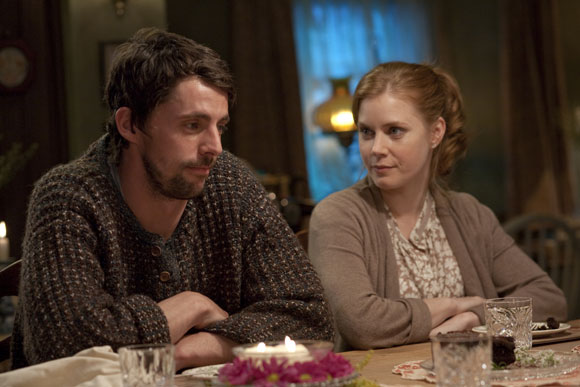Leap Year

Of the standard rom-coms with the Countryside Getaway Revelation plot, I’ve seen too many to count. The characters you know, Jeremy (Adam Scott) the narcissistic cardiologist and Anna (Amy Adams) the creative apartment stager. It’s never a bus driver and a sanitation engineer in these sorts of movies. Why? Because the low-fi fantasy getaway would be moot, of course.
Anna and Jeremy are moving in together, trying to land a prestigious co-op apartment. Skilled in presentation, Anna smooth-talks the committee by stroking their egos. But before they receive confirmation, Jeremy is dispatched to Ireland on business. Anna expected him to propose, but he left her with a pair of earrings. Insistent that she’s not a superstitious person, she embraces family superstitions under the guise of family tradition—in this case, the belief that confronting your beloved on February 29 in Dublin is a guaranteed lock for marriage. So why didn’t they call the film Leap Day? Nevermind.
Anna decides to surprise Jeremy by traveling to Ireland to meet him in Dublin. This sets the stage for various slapstick scenes, mostly inolving a miserable, wet, muddy Anna getting everywhere but her destination. She finds herself in Cardiff, Wales, at one point, asking if she can get a boat to Dublin. But having managed her way this far, she does make it to a small, Irish pub run by a jack-of-all-trades, Declan (Matthew Goode). In a spot himself, having to pay off a landlord, he agrees to drive her for €500, but not before messing with her. She’s given a number to call for a cab, only to hear some bickering and reply, “What do you mean you don’t drive American redheads?”
Despite the silly, vacant nature of the screenwriting, Amy Adams (as usual) inhabits the role with charm and sincerity. She makes us believe in this fastidious character’s determination, even though we already know the outcome. Matthew Goode, despite a horribly phony Irish brogue, effectively characterizes her cynical foil. “You’re a con artist,” he quips, when she describes her job, staging apartments with temporary furniture to persuade buyers with a livable space.
The movie, at times, becomes self-aware, with Anna presciently analyzing her own moves. It serves effectively to explain the conscientious departures from formula—however scarce. When we think that a catharsis is in play to falsely inflate dramatic tension, Anna emerges from a coffee shop with two cups instead of having abandoned her unwitting suitor. These moments, though, are at odds with lapses of logic: How does someone become an affluent, working-class (i.e. not idle rich) Manhattanite and still fall for the “sure we’ll take you to Cork; hand us your luggage first” gag three-thousand miles away from home? Also, there’s that critical “Three’s Company” moment of dramatic conflict, easily resolved if Declan would simply explain to Anna his aversion to weddings when they decide to crash one. This narrative failure is simply a plot device to delay the liberating truth, resolved later by revelatory inebriation.
Ms. Adams and Mr. Goode are capable of showing greater comic depth than is on display in this relatively shallow, recycled parable of serendipitous discovery of true love. In Enchanted, she plays a Disney princess brought to life, given more tension to work against as the real world differs so drastically from her own fantasy kingdom. Here, she’s given the kind of role Sarah Jessica Parker was born to play, and did just a few weeks ago, in the insipid Did You Hear About the Morgans? While I can’t abide Matthew Goode’s phony Irish accent, Ms. Adams’ younger version of Nicole Kidman’s perky personas (e.g. Moulin Rouge) makes the film palatable, almost enjoyable… every fourth scene or so.
 Leap Year • Dolby® Digital surround sound in select theatres • Aspect Ratio: 2.39:1 • Running Time: 97 minutes • MPAA Rating: PG for sensuality and language. • Distributed by Universal Pictures
Leap Year • Dolby® Digital surround sound in select theatres • Aspect Ratio: 2.39:1 • Running Time: 97 minutes • MPAA Rating: PG for sensuality and language. • Distributed by Universal Pictures